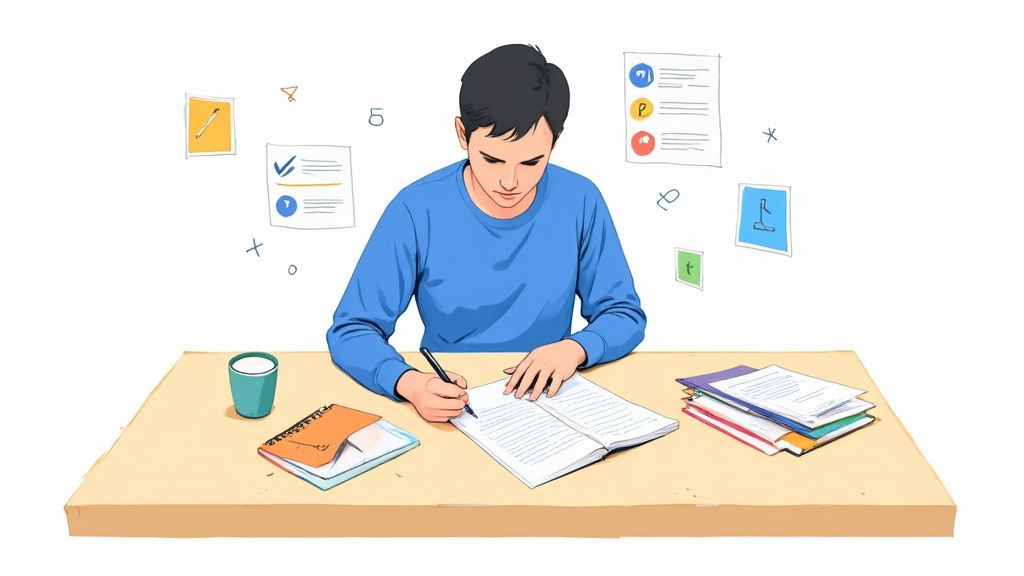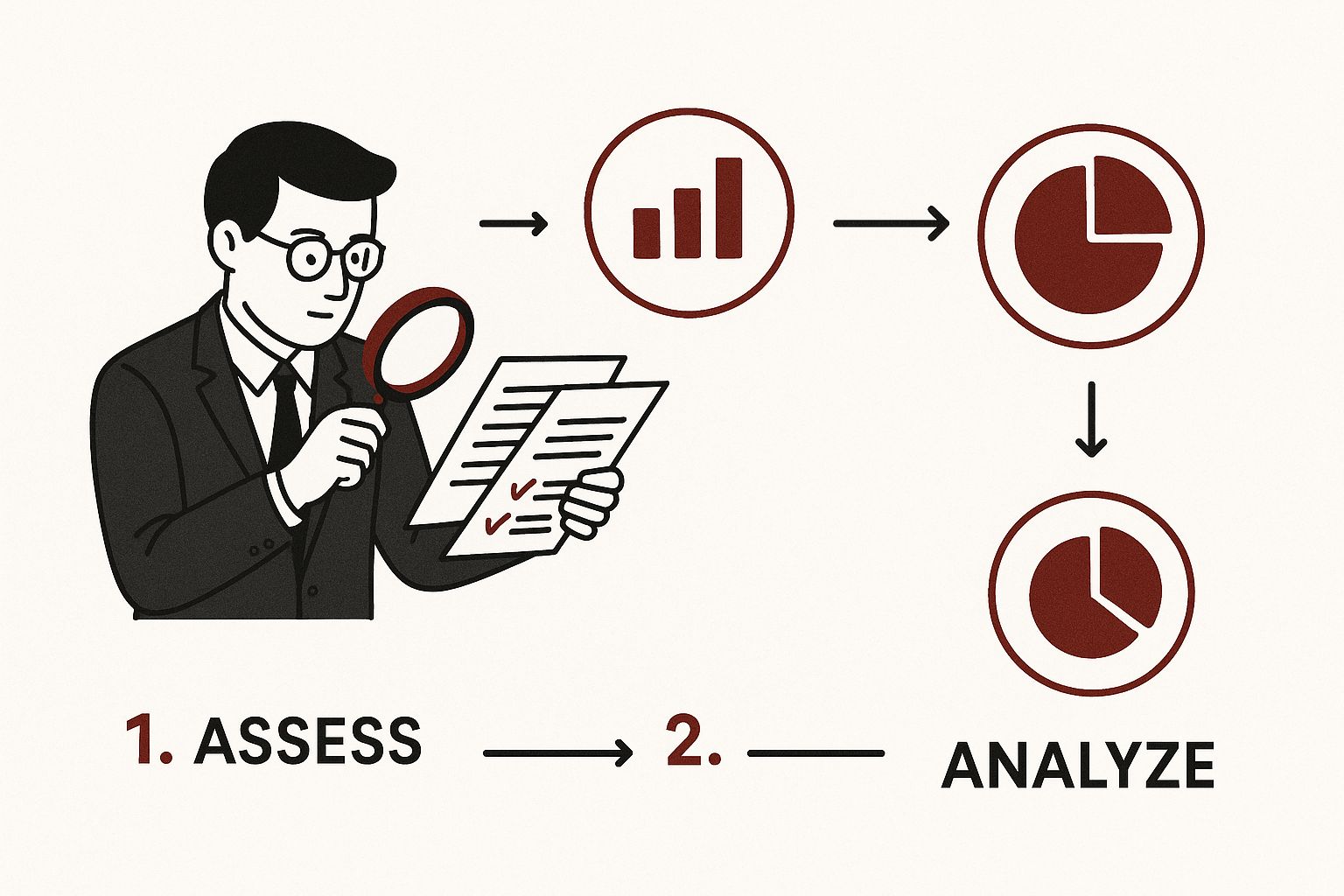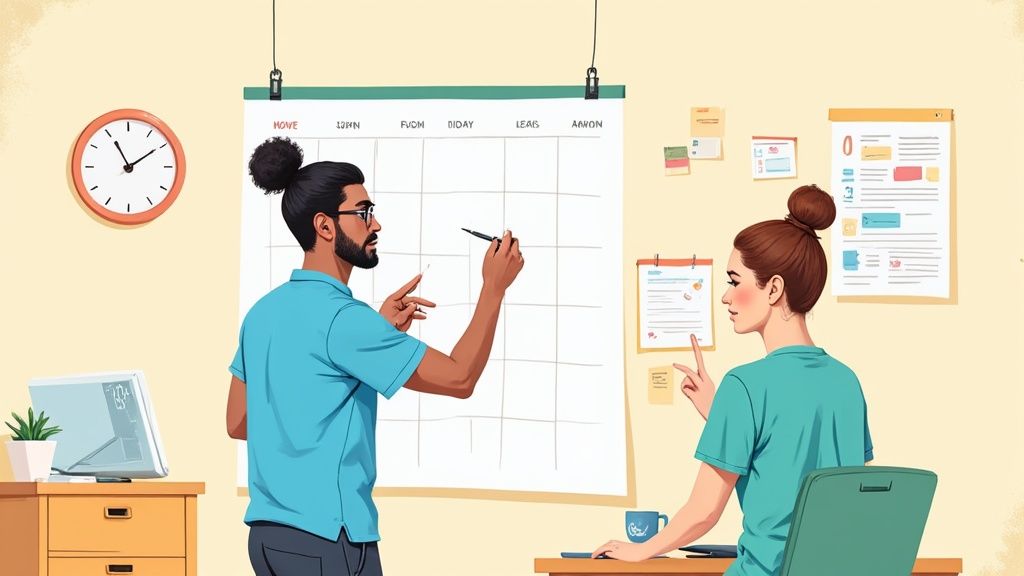An adult learning disability assessment isn’t a test of your intelligence. A better way to think about it is as a comprehensive process that creates a personalized user manual for your brain. It’s all about identifying your unique cognitive strengths and challenges to finally understand how you learn best. This evaluation is a collaborative journey toward self-discovery and empowerment.
What an Adult Learning Disability Assessment Really Is
For many people, the path to an adult learning disability assessment starts after years of unexplained struggles—in their careers, in school, or even just in daily life. It’s a step people often take when the usual strategies just don’t seem to click, leaving them feeling frustrated or blaming themselves for challenges they can’t quite name.
This whole process is fundamentally about getting clarity. Think of it like a diagnostic tool, almost like an MRI for your mind, that helps map out your brain's specific wiring for processing information. It’s designed to answer critical questions you’ve probably been asking for a long time:
- Why do some tasks feel completely overwhelming while others come so easily?
- Are there specific cognitive patterns affecting my memory, organization, or reading?
- What practical support and strategies would actually work for me?
The goal isn't to assign a label but to provide a roadmap. This roadmap can unlock access to workplace accommodations, effective learning techniques, and a deeper sense of self-understanding that validates lifelong experiences.
Ultimately, an assessment gives you the "why" behind your challenges and the "how" to move forward successfully. To see this in action, you can learn more about the structure of a learning disability evaluation and the real-world benefits it provides. It’s a powerful first step toward finally aligning your environment with your natural abilities.
Why Getting Assessed as an Adult Is a Game Changer
Deciding to get a learning disability assessment as an adult can feel like a huge step, but the impact it can have is massive. For so many people, it’s the moment when years of struggling without answers finally start to make sense. It can feel like a massive weight of confusion and self-blame is just… gone.
This isn't just about feeling relieved. It's about taking back your own story.
The whole narrative shifts from "What's wrong with me?" to "Oh, this is just how my brain is wired." That change in perspective is incredibly powerful and can do wonders for your mental health and self-esteem. All those past difficulties in school or at work are suddenly re-framed. They weren’t personal failures; they were challenges you faced without the right toolkit.
Unlocking Practical Support Systems
Beyond that personal "aha!" moment, a formal diagnosis is the key that unlocks real, tangible support. It’s the official documentation you need to access resources that can level the playing field at work and in school.
With an assessment in hand, you can finally advocate for yourself and get:
- Workplace Accommodations: Think quieter workspaces, helpful software, or more flexible deadlines on projects. These aren't special favors; they're adjustments that allow your actual skills to shine through.
- Higher Education Support: In college, a diagnosis can qualify you for essentials like extra time on exams, help with note-taking, or access to assistive technology.
- Personalized Strategies: The results are like a roadmap to your own mind. They highlight your cognitive strengths and help you build effective, personal strategies for everything from organization to time management that actually work with your brain, not against it.
An assessment is not an endpoint; it's a starting point. It transforms abstract struggles into concrete challenges with actionable solutions, paving the way for a more successful and less stressful future.
This is especially critical when you consider the real-world barriers people face. The employment stats for adults with learning disabilities aren't great. Only about 46% of working-age adults with learning disabilities in the U.S. have a job, and they are twice as likely to be unemployed as their peers. You can read the full research about these systemic challenges to see why getting formal support is so important.
An assessment is the tool that helps you push back against those barriers, giving you the official leverage needed to build a more equitable path forward.
A Look Inside Your Comprehensive Evaluation
The idea of a formal evaluation can sound a little intimidating, but there’s nothing to be nervous about. Think of an adult learning disability assessment as a structured process designed to build a complete, holistic picture of your unique learning profile. It all starts with a simple conversation.
First up is the intake interview. This is where you'll sit down with a psychologist and talk through your personal, medical, and educational history. This conversation provides crucial context, helping the professional understand the challenges you've been facing and what you're hoping to achieve.
Mapping Your Cognitive Abilities
After the interview, the assessment moves into a series of standardized tests. These aren't pass-or-fail exams you need to study for. Instead, they are tools designed to measure specific cognitive and academic skills. Think of each test as a different lens, bringing a particular aspect of your learning style into sharp focus.
The infographic below shows how a professional pieces together all these different data points to get a cohesive understanding.
This process is all about analyzing and synthesizing various test results to spot the patterns in your cognitive profile.
The evaluation itself is made up of several key components, each one designed to uncover specific information about how your brain works.
The Core Components of Your Assessment
Here’s a breakdown of what to expect during a typical evaluation, what each part involves, and why it’s a crucial piece of the puzzle.
| Component | What It Involves | Why It's Important |
|---|---|---|
| Cognitive and IQ Testing | Measures reasoning, problem-solving, and general intellectual ability. | Provides a baseline for your overall cognitive functioning. |
| Academic Achievement Tests | Assesses your skills in core areas like reading, writing, and math. | Compares your academic skills to your cognitive potential to identify gaps. |
| Specific Processing Tests | Dives deeper into areas like memory, executive functions (planning, organization), and language skills. | Pinpoints specific strengths and weaknesses in how your brain processes information. |
This thorough approach ensures that every piece of the evaluation puzzle contributes to a clear and accurate final report.
We might also look into more specific areas depending on your needs. For some, this could include an auditory processing test for adults to see how the brain interprets sounds and spoken language.
By combining insights from your personal history with data from these targeted tests, the psychologist creates a detailed "user manual" for your brain. This comprehensive view is what makes a formal diagnosis both accurate and incredibly useful.
Ultimately, the goal is to empower you with knowledge. The process is collaborative, and the recommendations you receive will be personalized to directly address your specific strengths and provide you with strategies for areas that need more support.
In-Person vs. Telehealth Assessments: Which Is Right for You?
One of the first decisions you'll make is how you want your assessment to be conducted. Today, you have more flexibility than ever before, with two main options: a traditional in-person evaluation or a modern telehealth assessment.
There's no single "best" choice here. The right path really boils down to your personal needs, where you live, and what makes you feel most comfortable.
An in-person assessment is the classic approach, taking place in a psychologist's office. For many, there's a real sense of reassurance in meeting face-to-face. The clinical setting is also designed to be a controlled space, minimizing distractions to make sure the testing conditions are just right.
On the flip side, a telehealth assessment brings the evaluation to you through video calls. This has been a game-changer, especially for people who live in rural areas, have mobility challenges, or simply can't take a full day off to travel. You can do it all from the comfort of your own home.
Weighing the Pros and Cons
Both formats are designed to be comprehensive and effective, but they shine in different situations. It helps to see their strengths and weaknesses laid out side-by-side.
- In-Person Pros: You get a highly controlled testing environment and that immediate, non-verbal feedback that only comes from being in the same room as the clinician.
- Telehealth Pros: It offers unmatched convenience and accessibility, cutting out travel time and costs. Being in a familiar, comfortable space can also reduce anxiety.
- In-Person Cons: It requires travel and can be a scheduling headache, especially if you live far from a testing center or have a packed schedule.
- Telehealth Cons: You absolutely need a stable internet connection and a private, quiet space at home. Also, a few highly specialized tests might not be available virtually.
Ultimately, making assessments more accessible is what truly matters. Globally, adult participation in learning programs is incredibly low, and even lower for those with disabilities. In many countries, fewer than 5% of adults engage in these crucial activities, which can seriously limit their opportunities. Read more about these global educational gaps and see why flexible options like telehealth are so important for closing that divide.
How to Prepare for Your Assessment Day
Walking into your assessment day can feel nerve-wracking, but a little bit of prep work can make a world of difference. When you're calm and organized, the results will give you the clearest, most accurate picture of your cognitive profile. It’s all about setting yourself up for a smooth experience.
The single most important thing to remember is that this is not a test you can pass or fail. Seriously. The entire point is to get a genuine snapshot of your unique strengths and challenges. Trying to "study" or guess the questions won't help—in fact, it can get in the way. Being well-rested is far more valuable than anything else.
Practical Steps for Assessment Day
To feel your best, focus on these simple, practical steps in the 24 hours leading up to your appointment.
- Gather Your History: Pull together any relevant documents you can find. Think old school report cards, past performance reviews from work, or notes from any previous evaluations. This background information gives the psychologist valuable context.
- Prioritize Rest: This one is huge. Get a full night's sleep before your assessment. A tired brain simply doesn't perform at its peak, and you want the results to be a true measure of your abilities.
- Eat a Good Meal: Have a balanced breakfast or lunch before you head in. Keeping your blood sugar and energy levels stable will help you stay focused throughout the evaluation.
Your main job on assessment day is to just be yourself. Let go of any pressure to perform and simply engage with the tasks as openly as you can. This honesty is what makes the final report so useful.
Preparing for your evaluation helps you walk in feeling confident and ready. While focusing on these tips, it's also practical to understand the cost of neuropsychological testing to manage expectations for the entire process.
Turning Your Results Into a Roadmap for Success
Getting your adult learning disability assessment report can feel like a lot to take in. But it's so much more than just a diagnosis or a label—it's a personalized roadmap. Think of it less as a final verdict and more like a user manual for your own brain, packed with insights into your unique cognitive wiring. This report shines a light on both your strengths and the specific challenges you're facing.
The first step is a mental one: shift your perspective. Try to look past the diagnosis itself and zero in on the actionable recommendations inside. This knowledge is your single most powerful tool for self-advocacy, whether you’re navigating your career, college, or just daily life. It gives you the language and the evidence you need to ask for the right kind of support.
From Diagnosis to Action Plan
The real power of your assessment comes from turning those insights into a practical strategy. You can use your report to:
- Secure Accommodations: With documented needs in hand, you can confidently approach employers or schools to access tools that level the playing field, like assistive technology or more flexible deadlines.
- Find Specialized Support: You can now search for coaches, therapists, or tutors who have experience with your specific learning profile.
- Build Your Support System: Sharing what you’ve learned with family and friends can be a game-changer, helping them understand how to truly support you.
This process takes what felt like abstract struggles and turns them into concrete, manageable steps. By finally understanding how you learn and process information, you can start building an environment where you’re set up to thrive, not just survive.
Getting this right is crucial. Less than half (48%) of adults with learning disabilities are employed, compared to 72% of their peers without disabilities. You can discover more statistics about these challenges and see just why turning your assessment into a real action plan makes all the difference.
A Few Common Questions
When you're thinking about getting an adult learning disability assessment, a few practical questions almost always come up. Let's tackle the big ones: cost, timing, and whether that old diagnosis from your school days is still good enough.
How Much Is This Going To Cost?
This is usually the first question on everyone's mind. The cost can vary quite a bit depending on where you are and who you see, but a comprehensive assessment generally runs anywhere from $1,500 to over $5,000.
It's always a good idea to call your insurance company first, as some plans will cover a portion of a neuropsychological evaluation. You might also find more affordable options through local university training clinics or community health centers, so be sure to check those out.
How Long Does the Whole Process Take?
Patience is key here. From the moment you first reach out to getting that final, detailed report in your hands, the process typically takes several weeks.
The actual testing isn't a one-and-done appointment. It's broken up into a few different sessions and adds up to about 6 to 12 hours of face-to-face evaluation time. We find it’s much more manageable—and less exhausting—to spread this out over a few days.
A diagnosis from childhood provides valuable history, but most universities and workplaces require a current evaluation to grant accommodations. This is typically one completed within the last three to five years, as your learning profile and needs can change significantly over time. It ensures that any support you receive is based on your current abilities.
Ready to get some clarity and start building on your strengths? Sachs Center specializes in telehealth-based diagnostic assessments for adults just like you. Book your evaluation today and take that first step toward understanding how your mind works.


